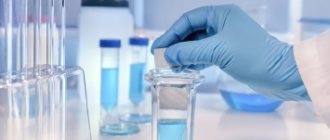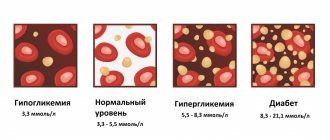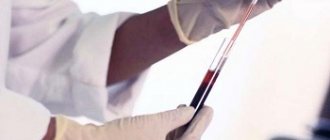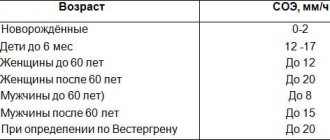A clinical blood test is a broad and informative diagnostic method that shows changes in blood plasma and formed elements (erythrocytes, platelets, leukocytes). However, the method is closely related to other diagnostic criteria and is not specific to a particular disease, with a few exceptions. A blood test for cancer can have varying degrees of diagnosis verification - from almost 100% for hematological malignancies to almost zero for solid tumors.
This is due to the fact that oncology can affect absolutely any tissue or organ, and, for example, with a disease of the hematopoietic system, a laboratory technician can see in the analysis the presence of specific altered cells, and with damage to a parenchymal organ (liver, lungs) - only general changes.
In this case, more in-depth tests will be required, which, in addition to the blood count, show changes in biochemical agents. And the newest technological methods also determine the antigenic composition of cells, the presence of specific cancer antibodies and other chemical markers (tumor markers).
When to take blood tests
Oncology does not have any strictly specific initial symptoms. The development of a tumor in the body occurs individually and depends on many factors - the localization of the pathological process, stage, condition of the body, and so on. However, there are several signs of cancer that most often allow you to suspect the disease at an early stage:
periodic unmotivated increase in body temperature to subfebrile levels (37.5-38.5 degrees);- gradual, causeless weight loss;
- weakness, asthenia, fatigue;
- increased night sweats.
Despite the fact that these symptoms can manifest themselves in various pathologies - from infectious to cardiac, when they appear, it is imperative to undergo a general blood test. And after receiving the results, the attending physician will refer you for in-depth diagnostic procedures, if necessary.
What indicators indicate cancer?
There are some screening tests that allow you to suspect a malignant tumor at an early stage. But the key word here is “suspect.” Currently, in order to confirm the malignant nature of a neoplasm, it is almost always necessary to perform a biopsy and histological examination. If cancer cells are found when examining a tissue sample under a microscope, the diagnosis is beyond doubt.
Laboratory studies of biological fluids that could accurately determine the oncological process in the body do not currently exist in clinical practice.
What are the types of blood tests?
All types of blood tests are divided into:
- general clinical analysis. Shows hematocrit (colored blood indicator), hemoglobin level, erythrocyte sedimentation rate and blood formula (concentration of blood cells in plasma).
- Blood chemistry. It examines such biochemical markers as liver transaminases (ALT, AST), bilirubin, creatinine, total plasma protein, C-reactive protein and, if necessary, glucose.
- Hormonal profile analysis. The concentrations of various hormones are studied - the thyroid gland, pituitary gland, adrenal glands, and so on. In order to determine how much it will cost to treat the pituitary gland in Israel or the thyroid gland, a blood test is an integral procedure.
- Blood clotting test or coagulogram. Among the indicators are thrombocytes, the concentration of blood clotting factors and the time of formation of conglomerates.
- Determination of the Rh factor and blood groups using erythrocyte antigens.
- Serological blood tests. The presence of antibodies to certain infectious agents is examined - for example, hepatitis C, HIV, etc.
- Determination of various tumor markers in the blood. At the moment, dozens of specific biochemical markers are known that are inherent in one or another type of oncology - intestinal cancer, breast cancer, and so on.
- Innovative genetic tests. In developed Western countries, special tests are carried out on the genetic profile of a cancer cell, which makes it possible to identify the type of tumor, its resistance to treatment and the risk of subsequent relapses.
- To determine thyroid cancer, the blood is tested for thyroid-stimulating hormone levels. If the disease is confirmed, the support service will contact you and you will be able to find out the exact prices for treatment of thyroid carcinoma in Israel.
So, can a blood test detect cancer? With a high degree of probability it is possible if you use methods appropriate to the situation (signs of the disease, stage). Now let’s look at what different types of tests look like for cancer.
General blood test for cancer
In a general clinical blood test, the erythrocyte sedimentation rate (ESR) primarily changes. With the development of a tumor process anywhere in the body, the adhesive properties of platelets increase, and the viscosity of blood plasma, on the contrary, decreases. Therefore, increasing ESR is the first thing you need to pay attention to.
However, this criterion should not be overestimated in differential diagnosis, since it can change in a number of other pathological processes and normally - with strong emotional experiences, diet, and so on.
The changes in the blood cell formula will also be nonspecific. In most cases of cancer, there will be an increase in monocytes and lymphocytes in the initial stages of the disease and a decrease in them in the later stages and with metastatic disease. This is due to the fact that at stages 3 and 4 of oncology, the immune and hematopoietic systems are already exhausted.
An exception is hemoblastosis - oncological diseases of the blood and hematopoietic organs (bone marrow). Thus, with lymphomas and leukemia, young and immature blood cells appear in the blood in large quantities, which are normally absent or there are single cells. This sign in the blood formula is leading and generally determining when making a diagnosis.
Indicators for blood cancer of hemoglobin, hematocrit, concentration of neutrophils and macrophages are practically of no use for detecting cancer, and their interpretation indicates an inflammatory process or other pathologies.
Cytological examination
This is the most informative type of laboratory examination, which accurately determines the presence or absence of malignant cells.
The analysis consists of taking a tiny section of tissue in which the presence of a cancerous tumor is suspected, with further examination under a microscope. Modern endoscopic technologies make it possible to collect biomaterial from any organ - skin, liver, lungs, bone marrow, lymph nodes.
Cytology is the study of cellular structure and function. The cells of a cancerous tumor differ significantly from the cells of healthy tissues, so laboratory testing can accurately determine the malignancy of the neoplasm.
The following biomaterials are used for cytological examination:
- imprints from the skin, mucous membranes;
- liquids in the form of urine, sputum;
- swabs from internal organs obtained during endoscopy;
- tissue samples obtained by puncture with a thin needle.
This diagnostic method is used for preventive examinations, clarifying the diagnosis, planning and monitoring treatment, and identifying relapses. It is simple, safe for the patient, and results can be obtained within 24 hours.
Blood chemistry
A blood test for biochemistry plays a lesser role than a general clinical test in the diagnosis of cancer. This is due to the fact that in the initial stages of cancer, almost all biochemical indicators of a person are normal, except for an increase in C-reactive protein. But this indicator is nonspecific and can increase in many conditions - systemic rheumatic diseases, infections and any inflammatory process.
Liver transaminases are almost always normal, except for liver and gallbladder tumors. In these types of cancer, ALT, AST, and bilirubin may increase. Creatinine may be elevated in stomach cancer and pancreatic cancer.
Preparation for tumor marker analysis
In order for the test results to be accurate, you should donate blood for tumor markers on an empty stomach. It's best to do this in the morning. If it doesn’t work out in the morning, then you should plan so that before donating blood for analysis, do not eat or drink anything other than water for at least 8 hours.
You should not drink alcohol on the eve of the test. It is advisable not to smoke for an hour before the test.
Patients who have undergone radical treatment are strongly recommended to be tested for tumor markers every 3-4 months.
Sign up for diagnostics Do not self-medicate. Contact our specialists who will correctly diagnose and prescribe treatment.
FAQ
When deciphering blood tests, patients often ask questions about how this or that indicator can change with cancer and what this can mean. Let's look at the most common of them.
Can a good blood test be detected in cancer patients?
Yes, it can if the disease is detected in the initial stages or at the compensation stage. In addition, do not forget that there are a huge number of types of blood tests and a situation may arise that there are no changes in the general analysis, and tumor markers were not detected.
However, the situation when a general blood test for cancer does not have any abnormalities does not occur so often
Is it possible to determine the stage of cancer using a blood test?
Oncology is staged based on many criteria, and most of them are purely clinical - the spread of the primary tumor, the presence of metastases in the lymph nodes and nearby organs, and so on. Therefore, if it is possible to draw a parallel with the stage using a blood test, then it is very approximately, and such an analysis should be highly specific, such as genetic tests or determination of tumor markers.
Is there a specific test to detect stomach cancer?
Stomach tumors cannot be detected by analyzing general blood tests. However, today there are innovative molecular tests that make it possible to determine gastric cancer and its antigenic set. This is the detection of PEA-1 tumor markers and the Foundation One genetic test, which completely determines the antigenic profile of a cancer cell. This test will show the cancer itself and determine its aggressiveness.
These tests are not carried out in all clinics in the world and are expensive. At the First Tel Aviv Medical Center, the patient has the opportunity to order all the latest genetic and molecular tests.
Can a blood test detect cancer?
Most often, even general and biochemical blood tests will show changes in indicators in the presence of cancer. However, this does not always happen and these changes may be associated with other reasons - infections, stress, and so on.
Identification of specific tumor markers is a more specific criterion, but they can also be elevated in related pathologies. But innovative genetic tests will always give an answer - what type of tumor led to the changes, whether it is treatable and show the degree of aggressiveness of atypical cells.
However, such tests are not performed in the CIS countries, so the answer to the question is no, there is no general test that determines cancer in the blood.
What tests should I take for blood cancer?
For hemoblastoses, the most effective will be a general blood test with a formula of cellular elements and a detailed biochemical analysis with the identification of tumor markers NSE and CEA-5
Deciphering a blood test for bone marrow cancer
In this situation, the general analysis will include immature cells and progenitor cells that are not normally found in the blood. During a tumor process in the bone marrow, they do not have time to develop to mature forms, enter the bloodstream and cease to perform their function
What examinations need to be done for early diagnosis of cancer?
The best results in cancer treatment are achieved when the disease is detected in the early stages of development. This is why regular self-examinations and screenings are so important. Every person who notices any abnormalities in themselves, for example, bumps or retractions on the skin, should consult a doctor as soon as possible. And the oncologist will prescribe a number of necessary tests. For example, the medical list of such examinations includes:
- visualization of internal organs and tissues;
- taking biological material for cytohistological analysis (biopsy);
- a number of laboratory methods, which include, in particular, clinical, biochemical and some other blood tests;
- genetic testing.
Imaging is a reliable and informative way to diagnose malignant neoplasms. Such techniques are used to determine the location of the tumor, assess its size, and interaction with surrounding organs and tissues. Based on the data obtained, it is possible not only to establish a preliminary diagnosis, but also to determine the stage of the disease, as well as monitor the effectiveness of the prescribed treatment.
Imaging tests in oncology may include:
- X-ray examinations;
- computed tomography;
- ultrasound, radioisotope, endoscopic studies;
- magnetic resonance imaging;
- positron emission tomography, which is usually combined with MRI or CT.
A tumor biopsy involves taking a tissue sample from an area of concern for cancer. Often, a biopsy is performed during an endoscopic examination, when a specialist has the opportunity to interact directly with the tumor. The resulting material is sent for study under a microscope in the laboratory. Such a study will make it possible to accurately understand the nature of the tumor (benign or malignant), determine its origin and stage of development, which is extremely important for developing a treatment regimen.








